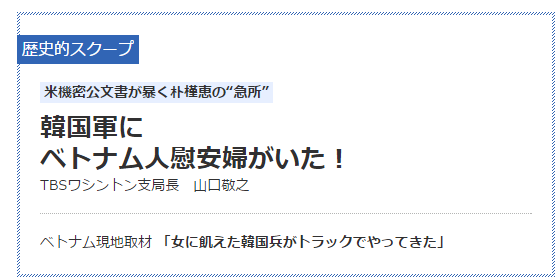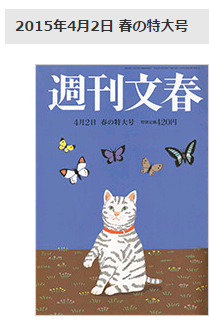hankyoreh
Links to other country sites 다른 나라 사이트 링크
Did S. Korea operate “comfort stations” in the Vietnam War?

“That Turkish bath was a ‘welfare center’ set up by the South Korean military exclusively for South Korean troops.”
Did South Korea run prostitution facilities similar to the Japanese military’s “comfort stations” in Saigon and other cities during the Vietnam War? This question is drawing new attention after a Japanese magazine report on the discovery of records suggesting so by the US National Archives and Records Administration (NARA).
At one level, the report comes across strongly as an attempt to draw attention away from Japan after South Korea’s persistent efforts to demand action from Tokyo to resolve the issue of “comfort women” forcibly mobilized as sexual slaves to the Japanese military. But the issue warrants investigation by the South Korean government - and if the allegations prove true, a serious effort should be launched to resolve the matter.

The report in question was printed in an extra-large “spring special” edition on Apr. 2 by the Shukan Bunshun weekly newsmagazine, one of the leading forces in promoting anti-Korean sentiment in Japan. The article was written by Noriyuki Yamaguchi, chief of the Washington bureau of the Tokyo Broadcasting System (TBS). Yamaguchi explained that he wrote the piece after hearing advice from an acquaintance he met before taking his post in the US capital. “There are unconfirmed reports that the South Korean military operated ‘welfare centers’ all over South Vietnam during the war,” he recalled the friend telling him. “If it’s possible to support this with data from the US government, then that makes South Korea ‘perpetrators’ on the comfort women issue. If President Park Geun-hye and the South Korean public can regain their objectivity and approach the comfort women issue seriously, then the situation could change.”
Yamaguchi proceeded to track down White House and State Department diplomatic documents from the war through different branches of the NARA, as well as trial and crime records. In July 2014, the long and difficult process paid off when he finally located a letter sent to Gen. Chae Myeong-sin, the South Korean military’s first commander in Vietnam between 1965 and 1969, by the US military command stationed in Saigon (now Ho Chi Minh City). While it did not indicate the exact date the US military wrote it, Yamaguchi said the surrounding circumstances suggested it would have been written “between January and April 1969.”
According to the article, the letter makes reference to the illegal diversion of large amounts of US supplies by the South Korea military in Vietnam. One of the places mentioned as a backdrop for the crime was a “Turkish bath for South Korean troops” located in central Saigon. The letter also reportedly refers to “acts of prostitution taking place” and “Vietnamese women working” at the Turkish bath. “While it is a welfare center exclusively for South Korean troops, US troops are also able to make special use for a fee of US$38 per visit,” the letter is quoted as saying.
After inquiring with US veterans who were aware of the situation in Saigon at the time, Yamaguchi heard reports that the “Turkish bath” there was a prostitution facility, as well as accounts that “the Vietnamese women who worked at the facilities were all very young and came from farming villages.”
Concluding the piece, Yamaguchi writes, “If President Park Geun-hye truly sees the comfort women issue as a human rights issue rather than a tool for domestic politics and diplomacy . . . then she will take the lead in investigating [the allegations] as with the example of the South Korean comfort women. Otherwise, [South Korea] would be proving to the international community that it is a country that ignores truths that are inconvenient to itself and refuses to confront history.”
Distasteful as it may be, the argument is also difficult to refute. Now it’s time for Seoul to sit down with Vietnamese authorities to find out the truth not only about the civilian massacres that took place during the Vietnam War, but also about the extent of military authorities’ involvement in operating and managing “welfare stations” for their troops - and to take appropriate follow-up action.
By Gil Yun-hyung, Tokyo correspondent
Please direct questions or comments to [english@hani.co.kr]

Editorial・opinion
![[Guest essay] The real reason Korea’s new right wants to dub Rhee a founding father [Guest essay] The real reason Korea’s new right wants to dub Rhee a founding father](https://flexible.img.hani.co.kr/flexible/normal/500/300/imgdb/original/2024/0423/8317138574257878.jpg) [Guest essay] The real reason Korea’s new right wants to dub Rhee a founding father
[Guest essay] The real reason Korea’s new right wants to dub Rhee a founding father![[Column] ‘Choson’: Is it time we start referring to N. Korea in its own terms? [Column] ‘Choson’: Is it time we start referring to N. Korea in its own terms?](https://flexible.img.hani.co.kr/flexible/normal/500/300/imgdb/original/2024/0423/3617138579390322.jpg) [Column] ‘Choson’: Is it time we start referring to N. Korea in its own terms?
[Column] ‘Choson’: Is it time we start referring to N. Korea in its own terms?- [Editorial] Japan’s rewriting of history with Korea has gone too far
- [Column] The president’s questionable capacity for dialogue
- [Column] Are chaebol firms just pizza pies for families to divvy up as they please?
- [Column] Has Korea, too, crossed the Rubicon on China?
- [Correspondent’s column] In Japan’s alliance with US, echoes of its past alliances with UK
- [Editorial] Does Yoon think the Korean public is wrong?
- [Editorial] As it bolsters its alliance with US, Japan must be accountable for past
- [Guest essay] Amending the Constitution is Yoon’s key to leaving office in public’s good graces
Most viewed articles
- 1[Column] ‘Choson’: Is it time we start referring to N. Korea in its own terms?
- 2Why Korea shouldn’t welcome Japan’s newly beefed up defense cooperation with US
- 3[Guest essay] The real reason Korea’s new right wants to dub Rhee a founding father
- 4Samsung barricades office as unionized workers strike for better conditions
- 5Senior doctors cut hours, prepare to resign as government refuses to scrap medical reform plan
- 6[Editorial] Japan’s rewriting of history with Korea has gone too far
- 7[Column] The clock is ticking for Korea’s first lady
- 8Opposition calls Yoon’s chief of staff appointment a ‘slap in the face’
- 9New AI-based translation tools make their way into everyday life in Korea
- 10Korean government’s compromise plan for medical reform swiftly rejected by doctors